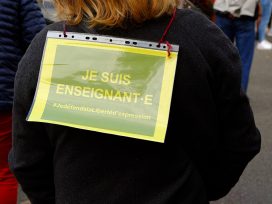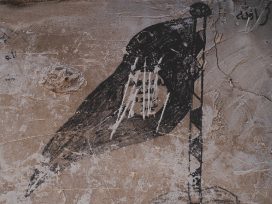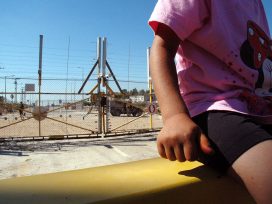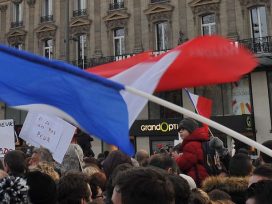On 22 July 2011, Anders Behring Breivik murdered 77 Norwegians, most of them young, in Oslo and Utøya . Since then not a day has passed when the events were not present in the Norwegian media. What has emerged is a country with renewed faith in its public sphere.
We now have better public debates. They might occasionally be harsher, but they are more concerned about decency and ethics. However this has so far failed to translate into greater transparency in politics and state administration.
The first few weeks after the attacks were not good, for many reasons. Public debate, especially on the left, was full of nasty characterizations and accusations of guilt by association. Scapegoats were sought: who had written or said something that could have influenced Breivik?
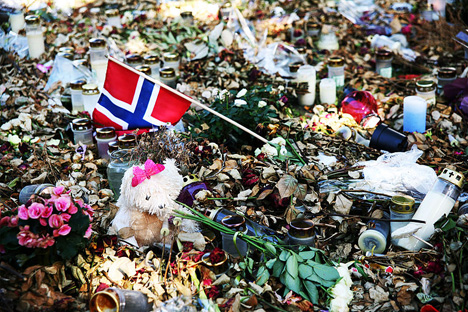
In front of Oslo’s cathedral, 9 August 2011 Photo: Oskar Seljeskog. Source:Wikimedia
A new expression appeared: “To ABB a debate” – to discredit writers who might be said to share in any way the terrorist’s ideas, or some of the many references in his infamous “manifesto”. Web debates, including unedited and non-moderated discussions on “the dark web”, were referred to repeatedly. After a while, more constructive dialogues started to appear, as former enemies began to engage. Socialists and conservatives exchanged new facts and insights, and asked each other: what are the essential elements in preserving a liberal democracy?
By autumn 2011, a stronger public sphere had emerged. It was more critical, more reflective and more open to new voices and experiences (as we also saw during the cartoon controversy). Younger people who might previously have kept out of unpleasant public debates demanded a role in the discussions. They became much more proactive in correcting errors and opposing dangerous and destructive attitudes.
Why did this happen? I think the reason is that a deeper understanding emerged of society’s vulnerability. The terror and the 77 victims showed Norway that something really is at stake. Whether young people will continue to be as visible and active in the public sphere remains to be seen. But I sincerely hope so.
As a newspaper editor, I have had contact with many of these young political activists from almost the moment the terror attacks occurred. Most are 15 to 20 years of age. They have made a very deep impression on me since that dark day.
I remember the first mass in Oslo Cathedral two days after the massacre and the bomb, with many of the survivors present, attended by our weeping king and queen. The day after, hundreds of people gathered in Oslo’s university square for a minute’s silence, together with the Royal family, the government and members of parliament. The silence stopped when some of the young politicians walked, hand in hand, across the square and into the crowd, after signing the official condolence protocol inside the University aula.
In courtroom 250, during the trial, I sat very close to young witnesses reliving events that no one should see and experience. This summer I visited one of the Labour Youth’s summer camps, where I met dozens of energetic, vital young people. When I came back to my office I checked many of the names. Most of them had been at Utøya during the terror, many of them had lost close friends, several had barely survived the most terrible day in recent Norwegian history. But now they were moving forward, shaping politics for a new climate – open, but more alert to the dangers facing a free society.
Exactly one year after the terror, I was standing in the big square in front of Oslo’s City Hall, listening to the magnificent concert commemorating the terror and its victims. We were celebrating everything the terrorists and his followers were attacking. Suddenly, I caught a glimpse of a bald man standing shoulder to shoulder alongside me. It was Geir Lippestad, Breivik’s defence lawyer.
There were tens of thousands of people on the streets of Oslo that night. One year earlier, as many as 200,000 people had gathered to show resistance to the ideology of the terrorist. Oslo has a population of 600,000. “Tonight our streets and squares are filled with love”, our crown prince said in a very poetic speech.
This compassion will inevitably fade. But, like in New York after 9/11, the sign of society’s resistance to the forces of destruction it is that compassion does not fade too much.
Apart from new emphasis on public security, the most important change is in our way of thinking about politics in general. In the public sphere, Norway is now more tolerant of unpleasant views and standpoints – as long as they stick to the facts. This is especially true of the controversial fields of immigration, integration, culture and religion. At the same time, there is less tolerance for views that might be directly dangerous and destructive.
Even before the terror, Norway had one of the most inclusive, egalitarian and democratic public spheres in the world, a sign of which was the large number of local, regional and national newspapers. Yet this has failed to lead to more political transparency, despite the prime minister’s assurances.
This unfortunate tendency has triggered more critical journalism than ever before in Norwegian history. The Norwegian media has begun to carry a huge amount of criticism of the failures in public institutions before and after the terror. Since the attacks, newspapers have become more cosmopolitan and interested in the ideas, ideologies, and broader developments that influence this small, wealthy, Scandinavian country. This could make Norwegian politics more interesting. It will also improve our chances of being able to understand and prevent terrorism and extremism in years to come.
An honest and more exacting public debate is helping us to create a better society. We will not tolerate hate speech against persons and groups, nor anyone promoting violence or criminality. But everything else must be given a place in the public sphere. Ferocity is one thing, hatred another.
This is not easy. It always hurts some people. It demands a sturdy faith in rationality and the virtues of a free and open society.
